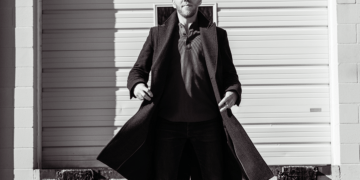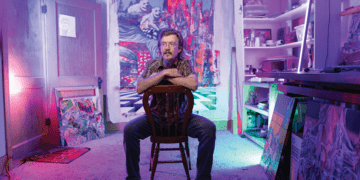Listen to this article here. Audio Provided by Radio Talking Book Service.
For time immemorial, people have strained against the unknown; subtle, often invisible forces crackling at the borders of perception. In ages past, such phenomena inspired myths, sagas, and mighty pantheons. Today, many are accepted as empirical fact, though hardly less remarkable—clockwork ocean tides wound daily by the moon’s circadian turns; monstrous, bewildering skeletons neatly catalogued in the fossil record; the potential and devastation wrought by dividing matter to a point once imagined indivisible. Yet, after millennia of intellectual rigor, an ancient dilemma defies consensus, despite, or likely because of, its proximity to the minds in doubt.
The nature of knowledge, in and of itself.
Some thinkers, like the existentialists, believe that knowing—the sum of identity, experience, and memory—cannot be arrayed beyond broad, impressionistic, and ultimately subjective strokes.
Others, like 25-year-old Jacob “Cubby” Phillips, ascribe to an opposing school of thought. Under the umbrella of ‘analytical philosophy,’ at least one tool is deft enough to shear objectivity from the metaphysical: pure logic, knapped to its most piercing linguistic edge.
Though debate is endless and rife with contrasting views, Phillips’ arguments are sound—strung together potently, wordlessly, from the neck of his Eastman hollowbody guitar.
“It’s a term I’ve picked up from my reading, a term from the philosophy of language,” said Phillips on the title of his inaugural studio album, Prompted Assent. “There’s a guy named Willard Van Orman Quine who developed this notion of ‘prompted assent.’ The short and sweet of it is, it’s a pre-linguistic recognition of truth. Oftentimes we think of truth as being associated with language. So, like, a sentence is ‘true’ or ‘false,’ right? But Quine felt that we needed a notion of truth that was even prior to language […] Truth is more fundamental than language—or our ability to grasp the truth, I should say, is more fundamental than our ability to grasp language.”
In simplified terms, words are malleable in the hands of circumstance—as likely to muddle truth as to clarify it. To Quine and Phillips, carrying and exchanging shared meaning requires a less porous vessel, however soluble its contents—the textured chords, modal harmonies, and unfettered solos of improvisational jazz, for example.
“So that ties to the music, at least in my understanding of improvisation, we’re trying to interact with, to build upon, what the other musicians are doing—to assent, or to dissent sometimes—in a way that isn’t the product of deliberation. Not hindered by thought, it’s a spontaneous agreement, or disagreement, to what each musician is doing,” Phillips explained. “That’s the source of my improvisation and my group’s music. The album is meant to emphasize this kind of primordial response to our interactions with others.”
A solitary note plucked from a rosewood fretboard, exposed and shivering as snares whisper in ambush; a wail of brass, joyous and defiant, kicking and splashing in the wake of an abandoned harmony; sparkling enamel, flashing over candlelit cloth and crystal carafes. Communication between musician and musician; musician and audience. Assent and dissent, untethered from translation.
“Spontaneous creation requires a very particular kind of skillset, but not a particular methodology in which you’re trying to train your hands to play licks,” Phillips continued. “Quite the contrary, you’re trying to train your hands to be as unencumbered as possible, so that beauty can emerge…and to me beauty is among the most important things, because beauty inspires love and beauty is the result of love. It’s not that my life imitates my improvisation, it’s that they are the same thing—a practice in openness, and the marriage between receptivity and strength.”
Though Phillips continues to develop his crafts (as both a musician and a writer), he’s reached an important milestone with the recording and imminent release of Prompted Assent. It marks a culmination of experiences and chance encounters from his upbringing and education—his Syrian Orthodox heritage and explorations of Tantrism, his performances with area punk and alternative outfits such as Chemicals, Icky Blossoms, and InDreama, and of course, his philosophy studies and jazz band rehearsals at the University of Nebraska Omaha. However, one prominent figure has offered a guiding hand since the onset of his career.
“My earliest musical memory is of Bob Marley,” Phillips said. “I even remember the song; “Buffalo Soldier” from the album Confrontation […] Bob Marley’s spiritual vision is really important to me. So, going into the main recording sets for [Prompted Assent], I read lyrics from Bob Marley’s “Mix Up, Mix Up” to set the tone for the sessions. Then, we recorded a Bob Marley track for the album.”
While the majority of Prompted Assent is, in Phillips’ words, “jazz–free, f***ing wild, jungle jazz—energy music” and was mastered by Grammy-nominated instrumentalist and sound engineer Nate Wood in New York City, Phillips entrusted his group’s cover of Marley’s “Jump Nyabinghi” to local producer and audio engineer Keith Rodger, widely known as “Kethro.”
“Cubby and I have had a really good, long relationship musically,” Rodger noted. “He trusted me with this particular tune (“Jump Nyabinghi”), to bring my flavor and attention to it. To me, the tune had to honor Bob’s legacy—what he’s done for the culture and music in general—but also highlight this modernized twist of musicians that are extremely, extremely talented. Most of my work was done in the chopping room, the editing room, before I passed it to the mixing and mastering engineer to work their magic.”
Over years of working together, Rodger has not only developed a strong sense for Phillips musically, but personally. He believes the young instrumentalist has stoked the coals for a radiant future.
“As an individual, he’s one of the most intelligent people I know; not only with academics, but emotions. He has such an optimistic view of the world, and he’s not afraid to take risks in those environments either,” Rodger affirmed. “I truly believe that when it comes to the next generation of greats—whether it’s jazz music or guitar-based music—I truly believe Cubby’s going to be known as one of the heavy hitters coming out of our city. I think his records will last a really long time for those who respect the craft.”
As of June, Phillips resides in New York City, though he plans “to continue going back and forth [from Omaha]” because his mind “works differently in these two different places”—for the urgency and endless fonts of inspiration in NYC, and the stillness and creative freedom of Omaha. Indeed, he debuted Prompted Assent’s eponymous track at the 2022 Omaha Under the Radar festival to great fanfare.
“My plan is to continue to develop my relationship with my craft; to display my relationship with the guitar in a very naked way. Living in New York City, I want to take this time to find collaborators here,” Phillips said. “But I’m not trying to create some grand empire, you know? I’d like to go with the flow and be a part of things that are bigger than me and just realize that, if I can develop a deeper relationship with my art, then I trust that the fruits will come.
“My life and my art are totally blended together; there’s less and less of a distinction, which is what I want. I like the unity of that.”
Prompted Assent will be released November 16, 2023 and is now available for pre-order on bandcamp. For more information, check out Phillips’ Instagram @
lordcublington.
This article originally appeared in the October 2023 issue of Omaha Magazine. To receive the magazine, click here to subscribe.














